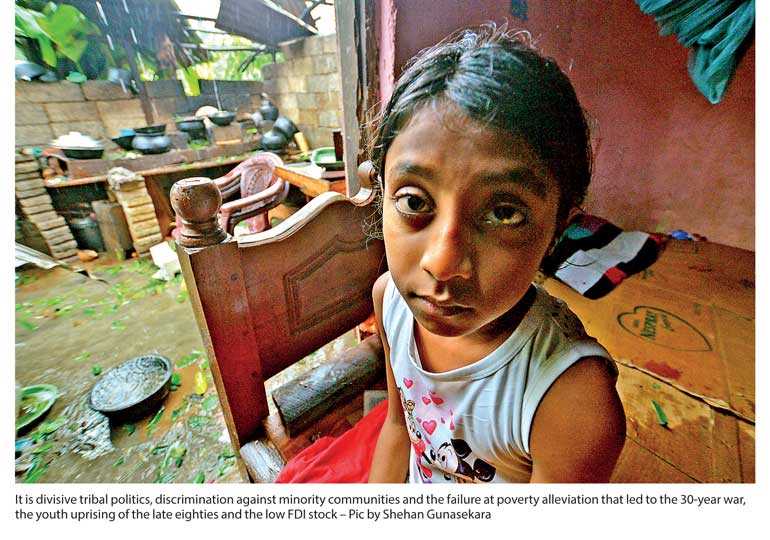Monday Feb 23, 2026
Monday Feb 23, 2026
Wednesday, 25 July 2018 00:00 - - {{hitsCtrl.values.hits}}

 It is perhaps the dark clouds that appear over the horizon in Sri Lanka that made Jayakala Mahesvaran speak nostalgically about the return of the LTTE. It is a reference to the dark mood that prevails in the north and the east after the electorate voted against the present Government at the last Local Government elections and made reconciliation among communities as well as settlement of grievances in such areas impossible.
It is perhaps the dark clouds that appear over the horizon in Sri Lanka that made Jayakala Mahesvaran speak nostalgically about the return of the LTTE. It is a reference to the dark mood that prevails in the north and the east after the electorate voted against the present Government at the last Local Government elections and made reconciliation among communities as well as settlement of grievances in such areas impossible.
Promises,promises!
It is divisive tribal politics, discrimination against minority communitiesandthe failure at poverty alleviation that led to the 30-year war, the youth uprisingof the late eightiesand thelow FDI stockof about $ 10billion (most of itfor construction and not for manufacturing for export) to Sri Lanka (SL) while some of theEast Asian economieshad FDI stocks of hundreds of billions and evenUS$ trillions as of 2016.This was made worse by adoption of economic policiesthat did not lead to incomegrowth. Theresult was a high level of poverty and hardship all round.
So thewinning coalition at the2015/16 electionsgave hopes of a new Constitution to restore the rights of all citizens, decentralisation of governing power,settlement of grievances especially of the people in the north and the east, better governance and law and order, elimination of corruption,higher investment for creatingone million new jobs and a spurt in export expansion to earn American dollars to helpsettle our massive external debts and so on.
Failure!
Nothing of the sort happenedeven afterthree-and-a-half years due to the absence of a passion to serve the people, theaddictionto corruption and the surprisinginefficiencydisplayedby the new Government. The people were so angry that they voted in large numbersagainst it at the lastLocal Government elections for political elements that do not support equal rights for the minority communities,advocate socialist policies not followed by the prosperous countriesof the worldand extendprotection for the tiny domestic market oriented business sector, which has failed to proliferate sufficient jobs for the unemployed youthandadequateexports to erase our external debts.So now it has become almost impossible to enact a new Constitution mainly to achieve reconciliation among the various communities and settlement of grievances particularly in the north and the east.
Another result of the absence of reconciliation and the inefficiency ofthe new Government is the continuance of political instability and insecurity that has prevailed in the country for several decades, leading tolow levels of export-oriented manufacturing investment, particularly by Foreign Direct Investors (FDI)who could bring in locally-scarcecapital, new technologies and access to global markets. It is the inadequacy of such investment for creating manufacturing production capacitythat has led to a serious decline in exports (33% of GDP in 2004 vs. 13% of GDP in 2017).
But the present Government wrongly believesthatthe decline is due tothe inadequacy of markets for our exports and is bent on promoting Free Trade Agreements;what is desiredis greater investment to create export production capacity especially byFDI.
Some successes!
But it is not correct to say that the Government has failed entirely in its efforts at promotion of investments and exports. It has succeeded in drawing up a fairly satisfactory set of policies for this purpose. They include a comprehensive Vision 20/25 document, a Policy on Trade and Investment, awell-prepared National Export Strategy (NES) that correctly aims at simplification of complex regulationsand an Enterprise Development Programme targeting mainly Small and MediumEnterprises(SMEs).
However, they are not without shortcomings. One of them is the emphasis on tradeand not on investment. The Enterprise Development Programme appears totarget SMEs, the failure rate of which is very high due to anabsence of adequate knowledge of financial, human resource and marketmanagement on their part;those who are not genuinealso may exploit theincentives offered. The low productivity of these due to theirsmall scale of operations/high unit costswill not enable them to be competitive inexports;it is thelarge firms,about 10%, of themthat undertakeabout90% of exports in SL.It is necessary to correct these weaknesses, for these programmes to succeed.
Adding to the successes
What the Governmentshould do to overcome the serious decline in exports is to incentivise particularly the large-scale domestic firms to invest in export-oriented ventures asthe FDI might keep away due to the continuation of political instability and insecurity,while encouraging the SMEs to operate as suppliers to direct exporters. The absence of such aprogramme is very unfortunate.
The import tariffs are very high, encouraging production for the domestic market; theselead to an absence of competition (among firms) thatnormally pressurises them to invest and add value to products towin well paying customers abroad and avoid competition from rivals.
There is alsoan absence of adynamic set ofincentives which could encourage export expansion. There are no tax holidays for exportersanymoreto compensate them for the constraintsthey still suffer from, such as the complex labour laws, the scarcity of labour with the required skills, cumbersome regulations (some being simplified under the NES);poor physical infrastructure such as quality power supplies with frequent cuts; the increase of theincome tax rate on profits generated from exports from 12% to 14%, an Economic Service Chargeto be paidby exporters as well and the numerous problems that exporters have with the Inland Revenue Dept., such as delays in VAT refunds and unsigned letters of demand,(though100% capital allowances are available on investmentsduring the first year andimported inputs are not taxed). Such weaknesses have to be corrected to succeed significantly inexport expansion. In fact exporters have to becared fordynamically, as the EDB did in the 1980s for this purpose.
Apart from private sector investmentthe Government too has to be active with capital expenditureand greater attention to carefully selected areasthat maximise the welfare especially of the poor without going feverishly after large/expensive construction projects that could generatebribes and boost heavy importsas well asfor improvingthe dark mood ofthe people especially in the north and the east.They arementioned below.
New Constitution
It is essential to create a new Constitution and other laws to introduce good governance/law and order,to build a stable socio political environment with:
Equal rights for all, devolution of power to local areasand other laws/regulations such as provisionsto deal withenforced disappearances,missing persons, grievances arising from racial discrimination andthe 30-year war, to settle the ethnic conflict issues once and for all that lead to socio political instability.
Separation of powers (among the Legislature, Executive and Judiciary) mainly to reduce harmful political interference particularly in the public/justiceadministrations.
First Past the Post,electionsystem to reduce the unit of election to the smallerconstituenciesand not the larger districts/areaswhich increases election campaign expenditurethat motivatesundesirable elements to offerbribesfor state captureas well as to strengthen the bond between the voterand the Parliamentarians/local politicians.
Independent commissions mainly to improve the public service to enable the appointment of officials based on merit as in Singaporeand not on political affiliations; this may involve the cancellation of Article 55.3 of the present Constitution which enables the President and the Ministers to interfere in making official appointments and promotions.
A system to achieve a better conviction ratein the courts of lawto improve law and order.
New articles in the Constitution and other lawsthat create special institutions that report only to parliament to deal with rampant corruption and other forms of crime and toempower them to bring the accusedbefore special courts and impose the strictest of punishments to those found guilty especially in view of the insecurity created by themagainst investment.
‘Teeth’ for Parliamentary committees such as the COPE, COPA andfor officials likethe Auditor General and AttorneyGeneralto deal with corruption in the public and private sectors as well as in political parties and improve thequality of management by public institutions.
Basic qualifications for MPs, so that parliamentarians with a better level of educationare electedto improve the quality of legislation and policies enacted/ formulatedbythe Parliament.
Reduced number of parliamentarians/localpoliticians and doing away with one of the levelsof the local administrationwhich hasnot been effective so far,the formerbeinga burden on the taxpayer.
Productivity of land
Since the British colonial administration initiated theLand Development Ordinance of 1935, all governments have been busyleasingout land(later most of it converted to grants)in small lots supported by irrigation and subsidiesto selfishly gain self-sufficiencyin food crops especially ricewithout pushingforreduction ofpoverty among the farmers.
Subsequentsubdivision of suchlandhasbeen so heavy that there are reported to be more than 45% of the lots which are less than 40 perches in extent according to the Censusof Agriculture 2002.It may be worse in 2018 .The tenure conditions have been so restrictive that farmershave beenengaged in litigationand numerous visits to meet officials who often demand bribes.This is mostly subsistence farmingand is one of the reasons for thelow productivityin rural agriculture. The net result is poverty among 85% of people in rural areas.
The solutions to these problems may involve the following:
a)Grant of ownership of the land to the genuine farmersafter a thorough analysis of the ground situation and the socio economic end results.
b)Consolidation of small land holdings in to larger lots; ownershipcould lead to this as subsistence farmers might sell their small holdingsand look for other work;asthis has not been done and adequate investment in manufacturing has not been pushed for either, excess labour in agriculture (27% of total employment) has built up leading to encroachment of steep hillsides andeven forest reserves.
c)Re-plotting (plottingcontiguously,instead of the normal location of properties far apart)andpaved roads to easemachinery use to createeconomies of scale (to reduce unit costs).
d)Givingpriority to development ofrural infrastructure including repair of irrigation works and provision of clean drinking water; theGovernment has launched a Rs. 9 billion programme for this purpose but it may be necessary to avoid the usual corruption in the award of such contracts, to maintain standards.
e)Supportingcultivation of crops(preferably exportable/drought resistant)on a large scalewith comparative advantage(production at lower unit costs than competitors).
Reform of the
system of education
It is strange that the Government, like all the previous administrations,never thought ofreforming the country’s thoroughly outdatedsystem of educationin pursuing the target of one million jobs byprovidingthe skills required byinvestors.In addition,as the job seekersdo not possess the required skills and lack proficiency in English, findingwell-paying jobs in the countryto get out of poverty becomes hard,compelling them togo abroad to work under slave like conditions.
This is one of the greatest crimes committed by all governments againstseveral generations ofyouth in SL. It should thereforerestructured without delay toprovide the hard or cognitive skills on basis of STEM subjects such asscience, technology, engineering, mathematics andICT, as well as thesoft skills (or social and emotional skills) such as thehuman values required to live and work peacefully as well ascreativity, hard work,leadership, management, team work, communication, etc.,and of course proficiency inEnglish demanded by businesses.
Conclusion
The failure of the Government to carry out its promises at the elections in 2015/16 hasraised several dark clouds over the horizonthat indicatethe country may be carriedback to a state of inter-communal clashesand lower investment, particularly by FDI.
What is needed by all political partiesis to take immediate action to defusethe situation as a base to carry the country collectively towards prosperity; these may include particularlythe creation ofa new Constitutionwith all the necessary features, support for the private sector to undertakeexport-oriented investment and measuresto reduce povertyparticularly in rural areas with special attention to the former war-affected regions.
The present Government could help in introducingall thiswithin the rest of its period in power by emphasising on the key result areas indicated above,without stooping tocorruption and unnecessary politicisationas in the case of thepublic services; if this is doneeffectively it may even win the hearts and minds of the people.
(The writer is a development economist.)